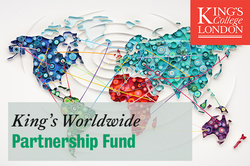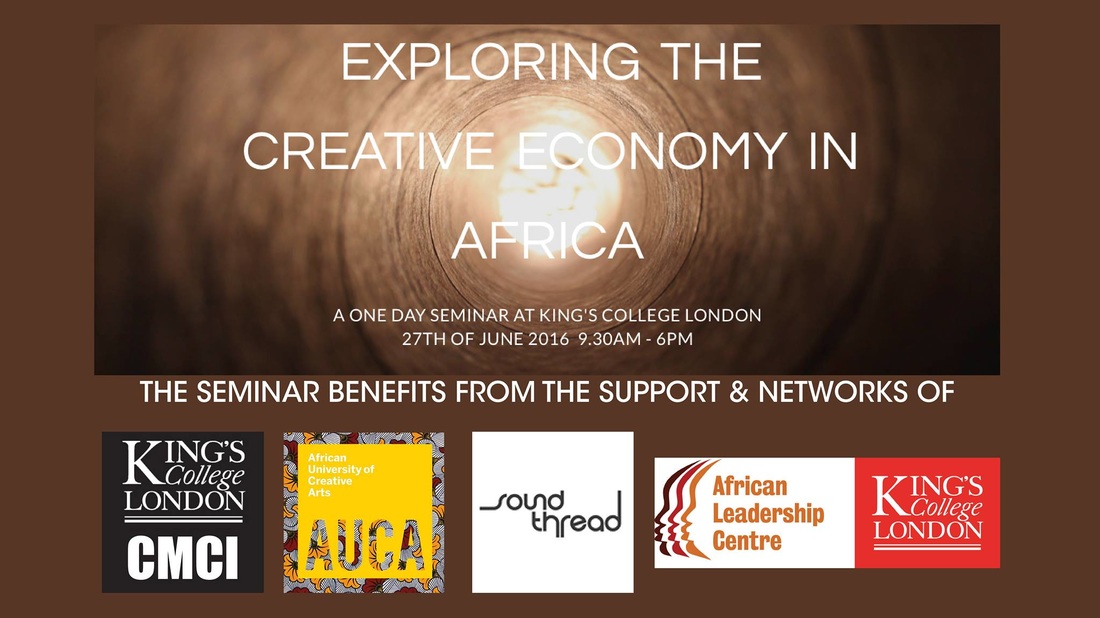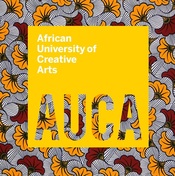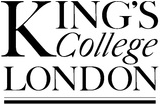Exploring the Creative Economy in Africa brought together academics, cultural practitioners and policy makers interested in exploring the dynamics of creative and cultural production in Africa and their connection with local contexts and policy frameworks on the 27th of June 2016, at King's College London.
In recent years there has been a growing interest on the role that cultural and creative industries play in developing economies, not only in reference to economic contribution but also in connection with social change and cultural engagement. In this one day seminar we bring together some academics, practitioners and policy makers who work in this field to reflect on the challenges and opportunities that the creative economy faces in emerging contexts like Africa.
The event was divided into three parts. The first part exploredthe role of policy and mapping in framing and understand the role that creative and cultural industries can play in different contexts. The second part focused on the role of creative education in supporting cultural development in Africa. The last part of the day focused on cultural entrepreneurship in Africa discussing informality, networks and financial issues, as well as new economic and business models.
The one day seminar was organised by Dr Roberta Comunian (King’s College London) in collaboration with Ejemen Ojeabulu (African University of Creative Arts) and Sam Jones (Sound Thread) with the support of King’s Worldwide Partnership Fund, The Faculty of Arts & Humanities and the Department of Culture, Media and Creative Industries.
In recent years there has been a growing interest on the role that cultural and creative industries play in developing economies, not only in reference to economic contribution but also in connection with social change and cultural engagement. In this one day seminar we bring together some academics, practitioners and policy makers who work in this field to reflect on the challenges and opportunities that the creative economy faces in emerging contexts like Africa.
The event was divided into three parts. The first part exploredthe role of policy and mapping in framing and understand the role that creative and cultural industries can play in different contexts. The second part focused on the role of creative education in supporting cultural development in Africa. The last part of the day focused on cultural entrepreneurship in Africa discussing informality, networks and financial issues, as well as new economic and business models.
The one day seminar was organised by Dr Roberta Comunian (King’s College London) in collaboration with Ejemen Ojeabulu (African University of Creative Arts) and Sam Jones (Sound Thread) with the support of King’s Worldwide Partnership Fund, The Faculty of Arts & Humanities and the Department of Culture, Media and Creative Industries.
Programme
9.30 – 9.50 Welcome Coffee
9.50-10.00 Opening Welcome and Introduction
10.00 – 11.20 The Creative Economy: Mapping & Policy perspectives
Introduction: Dr Roberta Comunian, King’s College London
11.50 – 1.15 Creative Education: Skills and Knowledge
Introduction: Ejemen Ojeabulu, African University of Creative Arts and Visiting Cultural Partner at King’s College London
1.15 – 2.15 Lunch Break
2.15 – 4.00 Creative and Cultural Entrepreneurship in Africa
Introduction: Sam Jones, Sound Thread
4.30 – 6pm Drink Reception in the Somerset House East Wing – Archaeology Room
9.50-10.00 Opening Welcome and Introduction
10.00 – 11.20 The Creative Economy: Mapping & Policy perspectives
Introduction: Dr Roberta Comunian, King’s College London
- Chi Onwurah, MP, Shadow Minister Culture & the Digital Economy
- Jen Snowball, Professor of Economics, Rhodes University
- John, Davies, research fellow Digital and creative economy, NESTA
11.50 – 1.15 Creative Education: Skills and Knowledge
Introduction: Ejemen Ojeabulu, African University of Creative Arts and Visiting Cultural Partner at King’s College London
- Prof Duro Oni, DVC University of Lagos Nigeria
- Louisa Waddingham, Director Programme British Council, Nigeria
- Yemisi Mokuolu, Director, Hatch Africa Solutions Ltd
1.15 – 2.15 Lunch Break
2.15 – 4.00 Creative and Cultural Entrepreneurship in Africa
Introduction: Sam Jones, Sound Thread
- Jeff Thompson – Unconvention + Off Axis
- Genevieve Pace, Programme Manager, Creative Industry Finance, Creative United
- Alessandro Jedlowski, post-doctoral researcher, Université de Liège
- Simon Dancey, Director of the Cultural Skills Unit at British Council
4.30 – 6pm Drink Reception in the Somerset House East Wing – Archaeology Room
THE SEMINAR BENEFITS FROM FUNDING FROM:

King’s Worldwide Partnership Fund








